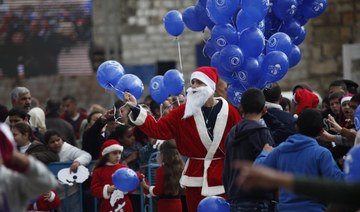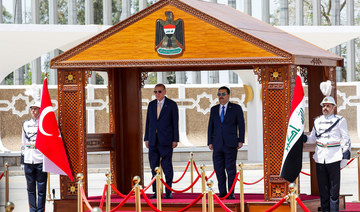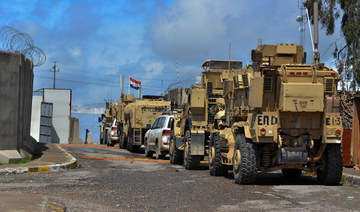JERUSALEM: An Israeli and three Palestinians were wounded on Wednesday in the first exchange of fire in months on the Gaza frontier.
The violence came as Israel announced measures aimed at improving living conditions in the occupied West Bank after a rare meeting of top officials.
Israel has announced a number of measures in recent months it says are aimed at easing tensions, but they have had little visible impact on the ground, where attacks by both Israeli settlers and Palestinians are on the rise. There have been no peace talks in more than a decade.
The Israeli military said a civilian near the security fence was lightly wounded by gunfire from Gaza, and that it responded with tank fire at multiple military positions manned by the Hamas militant group, which has ruled the territory since 2007. The Gaza Health Ministry said three Palestinians were wounded, without saying if they were civilians or fighters.
Earlier, Israeli Defense Minister Benny Gantz approved a series of measures aimed at improving relations with the Palestinians after hosting Palestinian President Mahmoud Abbas at his home in Israel late Tuesday.
It was the first time Abbas met an Israeli official inside the country since 2010. The two discussed security coordination between Israel and the Palestinian Authority, which administers pockets of the occupied West Bank.
Gantz’s office said he approved “confidence-building measures,” including the transfer of tax payments to the Palestinian Authority, the authorization of hundreds of permits for Palestinian merchants and VIPs, and approving residency status for thousands of Palestinians in the West Bank and Gaza Strip.
Israel collects hundreds of millions of dollars of taxes on behalf of the PA as part of the interim peace agreements signed in the 1990s.
The tax transfers are a key source of funding for the cash-strapped Palestinians, but Israel has withheld funds over the PA’s payment of stipends to thousands of families that have had relatives killed, wounded or imprisoned in the conflict. Israel says the payments incentivize terrorism, while the Palestinians say they provide crucial support to needy families.
Israel approved residency for some 9,500 Palestinians. Israel controls the Palestinian population registry, and over the years its policies have left an estimated tens of thousands of Palestinians without legal status, severely limiting their freedom of movement, even within the occupied territories. Israel granted legal status to some 4,000 Palestinians in October.
Israeli Prime Minister Naftali Bennett is opposed to Palestinian statehood. His government has shown no interest in reviving peace talks but has said it wants to reduce tensions by improving living conditions in the West Bank.
Recent months have seen a surge in violence by Israeli settlers against Palestinians in the West Bank, as well as Palestinian attacks on Israelis in east Jerusalem and the West Bank.
Gantz’s meeting with Abbas — the second in the six months since Bennett’s coalition government took office — drew vocal criticism from Israeli opposition lawmakers, including those from former prime minister Benjamin Netanyahu’s Likud party, the largest in parliament.
The Palestinians seek an independent state that includes all of the West Bank, east Jerusalem and the Gaza Strip, areas Israel captured in the 1967 Mideast war.
Hamas seized Gaza from Abbas’ forces in 2007, a year after the Islamic militant group won a landslide victory in parliamentary elections. Gaza has been under an Israeli-Egyptian blockade since then.
The Gaza frontier has been mostly quiet since Israel and Hamas fought an 11-day war in May — their fourth since Hamas took over Gaza. Israel holds Hamas responsible for all attacks emanating from Gaza, even those claimed by other armed groups.
Israel strikes Gaza after gunfire wounds civilian near fence
https://arab.news/pwbyc
Israel strikes Gaza after gunfire wounds civilian near fence
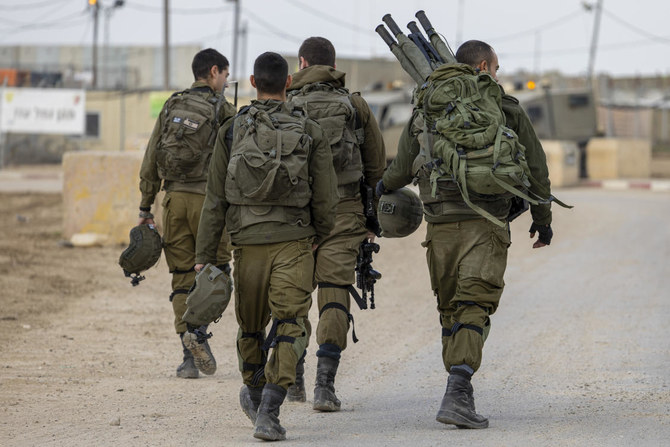
- The violence came as Israel announced measures aimed at improving living conditions in the occupied West Bank
- The Israeli military said a civilian near the security fence was lightly wounded by gunfire from Gaza
UN calls for international probe into deaths at Gaza hospitals
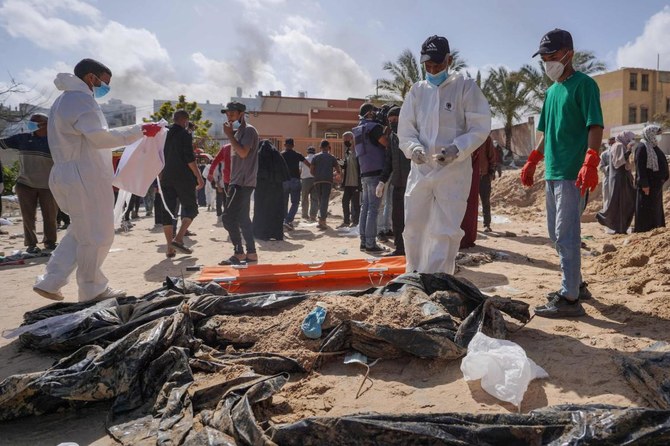
The United Nations rights office said it was “horrified” by the destruction of Gaza’s biggest hospital, Al-Shifa in Gaza City, and its second largest, the Nasser Medical Complex in Khan Yunis.
On Monday, the Palestinian territory’s Civil Defense agency said health workers had uncovered more than 200 bodies of people killed and buried at Nasser hospital, which was besieged by Israeli troops last month.
In early April the World Health Organization said Al-Shifa had been destroyed by an Israeli siege, leaving an “empty shell” containing many bodies.
The UN rights office on Tuesday demanded “independent, effective and transparent investigations into the deaths.”
“Given the prevailing climate of impunity, this should include international investigators,” UN rights chief Volker Turk said in a statement.
Hospitals, which are protected under international law, have repeatedly come under Israeli bombardment over more than six months of war in Gaza.
Israel has accused Palestinian militant group Hamas of using Gazan medical facilities as command centers and to hold hostages abducted during its attack inside Israel on October 7.
Hamas has denied those claims.
“Hospitals are entitled to very special protection under international humanitarian law,” Turk pointed out.
“And the intentional killing of civilians, detainees and others who are hors de combat is a war crime.”
The UN rights office said it did not have access to independent information as to what had transpired at the two hospitals.
But spokeswoman Ravina Shamdasani said efforts were under way to corroborate reports and details given by Gaza authorities.
The latter say 283 bodies were recovered from Nasser hospital, including 42 that had been identified.
“Victims had reportedly been buried deep in the ground and covered with waste,” she told reporters in Geneva.
Older people, women and wounded were reportedly among the dead, she said.
Others were allegedly “found with their hands tied and stripped of their clothes.”
As for Al-Shifa, the Israeli army has said around 200 Palestinians were killed during its military operation at the hospital
Shamdasani pointed to reports indicating that this toll “may be an underestimate.”
Around 30 bodies were reported found buried in two graves in the courtyard of Al-Shifa hospital.
“And there are reports that the hands of some of these bodies were also tied,” Shamdasani said.
So far, she said, the UN “can’t corroborate the exact figures” of people killed at the two hospitals, underlining: “This is why we are stressing the need for international investigations.”
“Clearly there have been multiple bodies discovered,” she said.
The reports that some had their hands tied indicated “serious violations” of international law, she added.
“These need to be subjected to further investigation... They can’t just be more reports in this horrific war that just pass under the radar.”
nl/rjm/gil
Qatar Foreign Ministry: No justification to end Hamas’ presence in Doha
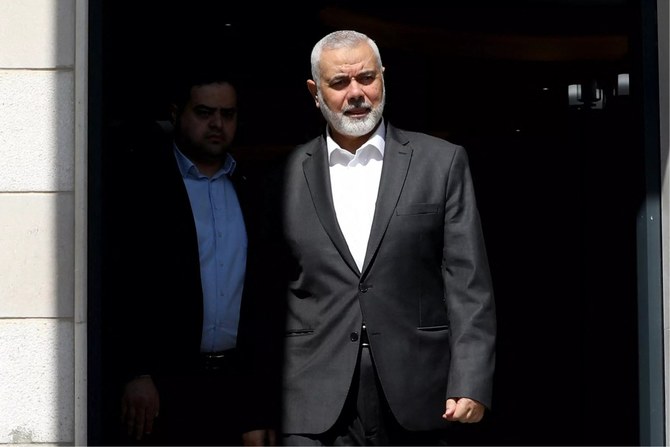
- Qatar said it was re-evaluating its role as mediator in ceasefire talks between Israel and the Palestinian group Hamas
DUBAI: Qatar said on Tuesday there was no justification to end the presence of an office for Palestinian militant group Hamas in Doha while its mediation efforts continued in the Gaza war.
Foreign Ministry spokesperson Majed Al-Ansari added in a press conference that Qatar remained committed to mediation but was reassessing its role in "frustration with attacks" on its efforts.
Last week, Qatar said it was re-evaluating its role as mediator in ceasefire talks between Israel and the Palestinian group Hamas, citing concerns that its efforts are being undermined by politicians seeking to score points.
Qatari Prime Minister Sheikh Mohammed bin Abdulrahman Al-Thani, who is also foreign minister, said there was a "misuse of this mediation for narrow political interests, and this necessitated Qatar to undertake a full evaluation of this role".
Turkiye’s Erdogan says Iraq sees need to eliminate Kurdish PKK militia
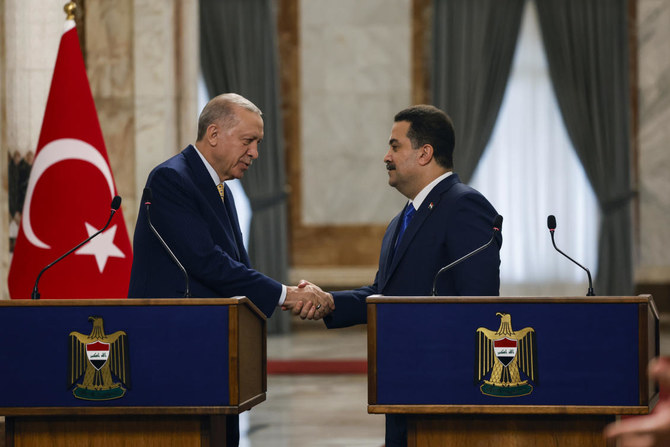
- Ties between the neighbors were entering a new phase after they agreed to cooperate against militants, boost economic ties
- Erdogan visited Iraq for the first time since 2011 following years of tensions as Ankara carried out cross-border attacks on PKK militants based in northern Iraq
ANKARA: Turkish President Tayyip Erdogan said in remarks published on Tuesday he believed Iraq saw the need to eliminate the Kurdish PKK militia and had the will to do so, adding Ankara wanted Baghdad’s support in that battle.
Erdogan was speaking after talks in Baghdad and Irbil on Monday, the first visit by a Turkish leader to Iraq since 2011, following years of tensions as Ankara carried out cross-border attacks on PKK militants based in northern Iraq.
Ties between the neighbors were entering a new phase, Erdogan said, after they agreed to cooperate against militants, boost economic ties via a new corridor and consider Iraq’s needs for access to scarce water.
Speaking to reporters on his flight back from Iraq, Erdogan said Turkiye’s battle with terrorism would continue in line with international law, and added he hoped to see concrete results of Baghdad labeling the PKK a “banned organization” last month.
The PKK, designated a terrorist group by Turkiye, the US and the European Union, took up arms against the Turkish state in 1984. More than 40,000 people have been killed in the insurgency.
The conflict was long fought mainly in rural areas of southeastern Turkiye but is now more focused on the mountains of northern Iraq’s mountainous, semi-autonomous Kurdistan region.
“One would hope that our neighbors put the necessary stance forward against the threats directed at us from their lands, and we continue this battle jointly,” Erdogan said, according to a text of the in-flight comments published by his office.
“Eliminating this threat is also to the benefit of Iraq. I believe they see this reality and they will now put forth a will for this issue to be removed,” he said, adding he also discussed steps against the PKK during talks in Irbil.
Asked about Iraq’s needs for access to water, Erdogan said Turkiye was not a country with abundant water resources and also had to manage its own needs. He added plans taking into account “changing climate conditions” were needed for the sustainable use of water.
“Therefore, we need to take cautious steps. With evaluations to be held in that direction, it may be possible to find common ground,” he said.
On Monday, the two countries agreed to a strategic framework agreement overseeing security, trade and energy as well as a 10-year deal on the management of water resources that would take Iraq’s needs into account.
Two Hezbollah members killed in Israeli strikes
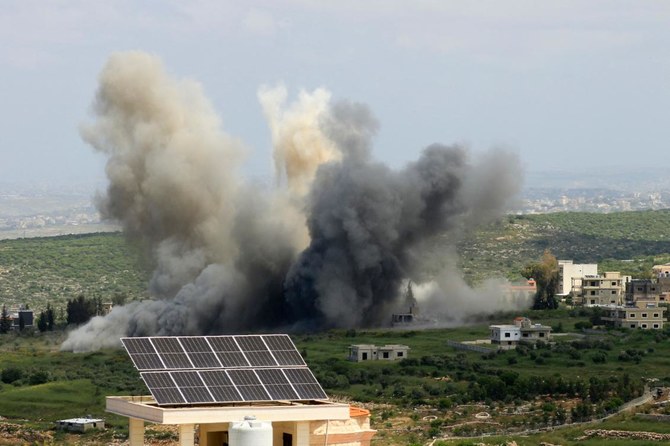
- The latest strike hit the Abu Al-Aswad area near the coastal city of Tyre
BEIRUT: Hezbollah announced two of its members had been killed by Israeli fire Tuesday, with the Israeli army saying it eliminated “two significant” members of the Iran-backed group in south Lebanon.
Since Hamas’s unprecedented October 7 attack on Israel triggered war in Gaza, there have been near-daily cross-border exchanges of fire between Hezbollah and the Israeli army.
But Hezbollah has stepped up its rocket attacks on Israeli targets in recent days.
On Tuesday morning, a source close to the group told AFP an Israeli drone strike deep into Lebanon killed an engineer working for Hezbollah’s air defense forces as he was traveling in a vehicle.
The strike hit the Abu Al-Aswad area near the coastal city of Tyre, some 35 kilometers (22 miles) from the border, an AFP journalist reported.
The fighter’s vehicle was completely burnt out.
Hezbollah said two of its fighters had been killed, one of them overnight.
The Israeli army said it had killed “two significant terrorists in Hezbollah’s aerial unit” on Tuesday morning and overnight.
On Sunday evening, Hezbollah shot down an Israeli drone, both sides said.
Since October 7, at least 378 people have been killed in Lebanon, mostly Hezbollah fighters but also 70 civilians, according to an AFP tally.
Israel says 11 soldiers and eight civilians have been killed on its side of the border.
Israel military strikes northern Gaza in heaviest shelling in weeks
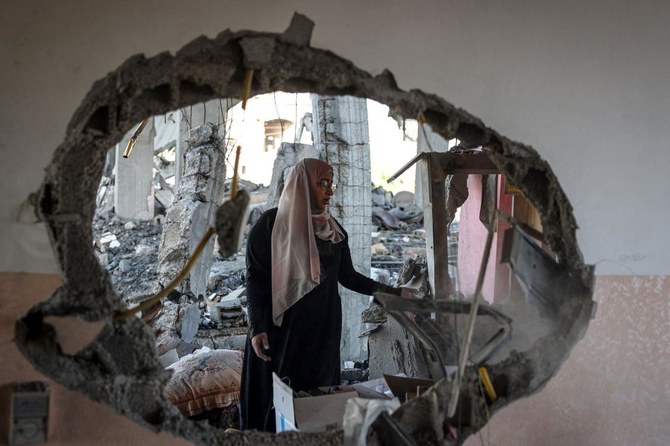
- Army tanks made a new incursion east of Beit Hanoun on the northern edge of the Gaza Strip, though they did not penetrate far into the city
- The renewed shelling and bombing of northern Gaza comes almost four months after the Israeli army announced it was drawing down its troops there
GAZA: Israel bombarded northern Gaza overnight in some of the heaviest shelling in weeks, causing panic among residents and flattening neighborhoods in an area from which the Israeli army had previously down its troops, residents said on Tuesday.
Army tanks made a new incursion east of Beit Hanoun on the northern edge of the Gaza Strip, though they did not penetrate far into the city, residents and Hamas media said. Gunfire reached some schools where displaced residents were sheltering.
In Israel, where government offices and businesses were shut to celebrate the Jewish Passover holiday, incoming rocket alerts sounded in southern border towns, although no casualties were reported.
The armed wing of Islamic Jihad, a group allied to Hamas, claimed responsibility for the rocket attacks on Sderot and Nir Am, indicating fighters were still able to launch them almost 200 days into the war, which has flattened large swathes of the enclave and displaced almost all of its 2.3 million people.
Thick black smoke could be seen rising in northern Gaza from across the southern Israeli border. Shelling was intense east of Beit Hanoun and Jabalia and continued on Tuesday morning in areas such as Zeitoun, one of Gaza City’s oldest suburbs, with residents reporting at least 10 strikes in a matter of seconds along the main road.
Just west of Beit Hanoun in Beit Lahiya, medics and Hamas media said strikes had hit a mosque and a crowd gathering on the coastal road to collect aid dropped from the air. Reuters could not immediately confirm those targets.
“It was one of those nights of horror that we had lived in at the start of the war. The bombing from tanks and planes didn’t stop,” said Um Mohammad, 53, a mother-of-six living 700 meters from Zeitoun.
“I had to gather with my children and my sisters who came to shelter with me in one place and pray for our lives as the house kept shaking,” she told Reuters via a chat app.
“I don’t know if we will make it alive before this war stops,” she added.
The Israeli army said rockets launched overnight into Israel had come from firing positions in northern Gaza. It had struck rocket launchers and killed several militants overnight, in what it called “targeted and precise” strikes.
“Over the past day, IAF fighter jets and additional aircraft struck approximately 25 terror targets throughout the Gaza Strip, including military infrastructure, observation posts, terrorists, launch posts,” it said in a statement.
Hitting areas where troops had withdrawn
The renewed shelling and bombing of northern Gaza comes almost four months after the Israeli army announced it was drawing down its troops there, saying Hamas no longer controlled those areas.
This month, Israel also drew down most of its forces in southern Gaza. But efforts to reach a ceasefire have failed, and Israeli bombardment and raids on territory where its troops have withdrawn are making it difficult for displaced Gazans to return to abandoned homes. Israel also struck Khan Younis in the south on Tuesday, a day after tanks raided eastern parts of that city.
Israel says it is seeking to eradicate Hamas, which controls the enclave, following an attack by the militant group on Oct. 7, killing 1,200 and taking 253 hostages by Israeli tallies.
Across the Gaza Strip, Israel’s military strikes killed 32 Palestinians and wounded 59 others in the past 24 hours, Palestinian health authorities said. They say more than 34,000 people have been confirmed killed in the seven-month war, with thousands more bodies as yet unrecovered.
Residents also reported bombing east of Deir Al-Balah on Tuesday in a central zone separating the north from the south.
In Nasser Hospital, southern Gaza’s main health facility, authorities recovered a further 35 bodies from what they say is one of at least three mass graves found at the site, taking the total found there to 310 in one week.
Israel says it was forced to battle inside hospitals because Hamas fighters operated there, which medical staff and Hamas deny.




